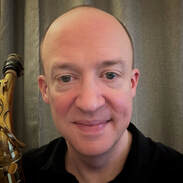University of Delaware - Adjunct professor of saxophone and jazz
Brooklyn College, Conservatory of Music - Adjunct professor of saxophone
New Jersey City University - Adjunct professor of woodwind doubling
Summer Music in Tuscany - Woodwind, jazz, chamber music, and composition teacher
UD Jazz in Istria - Jazz saxophone and composition teacher
If you or someone you know is interested in studying with Todd at one of the above places, please reach out. The 3 universities have very different programs, focuses, and degree programs.
Both of the summer programs are fantastic festivals to learn and play music in beautiful, "non-touristy" European towns with great faculty and many performance opportunities!
Todd is sometimes available for private lessons outside of the university setting. Please contact him if you are interested!
Teaching philosophy:
"I do not believe in a "cookie-cutter" method where one approach works best for everyone. I find it empowers the student to understand "when I do this, this is the sound that is produced." When a player develops a few of these relations, that player gains flexibility and control over their sound. (Watch my videos to hear me put this principle in action). Ultimately, I feel the happiest and best players are the ones who can produce the sound in their mind's ear, not only today, but in the future, adapting easily as their desired sound evolves over time. In a general sense, I try to work with my students to maximize their efficiency on their instrument(s). To me, an efficient approach is what works best, coming to fruition when producing the best and most sound with the least effort. Efficiency can also be applied over a wide variety of different tones and styles of music. While I use exercises of all kinds, some passed down from my teachers, others that I've developed along the way, I believe the primary focus should be on music. I try to find the right balance with my students...of course the quality needs to be consistent, but I find the quantity of music very important as well, since everything we play can influence everything else we play. With this approach, the goal is musical excellence achieved by approaching it from as many angles as possible.
As a teacher, the greatest joy is to hear my students perform to their best ability! If I were to have a general goal beyond that, it is: if a colleague of mine performs with a student of mine, I would love for that colleague's reaction to be, "You sound great! Who did you study with, I can't tell?!" This has happened a few times, and it's very gratifying for me because it means the student has found an individual voice at a very high level.
This same approach applies to my students who seek a career in music education. I've found that working in the above manner not only helps achieve great results for that individual, but it also leads to the ability to pass this along to that individual's students. I'm very proud that many of my past students are successful music educators!"
Brooklyn College, Conservatory of Music - Adjunct professor of saxophone
New Jersey City University - Adjunct professor of woodwind doubling
Summer Music in Tuscany - Woodwind, jazz, chamber music, and composition teacher
UD Jazz in Istria - Jazz saxophone and composition teacher
If you or someone you know is interested in studying with Todd at one of the above places, please reach out. The 3 universities have very different programs, focuses, and degree programs.
Both of the summer programs are fantastic festivals to learn and play music in beautiful, "non-touristy" European towns with great faculty and many performance opportunities!
Todd is sometimes available for private lessons outside of the university setting. Please contact him if you are interested!
Teaching philosophy:
"I do not believe in a "cookie-cutter" method where one approach works best for everyone. I find it empowers the student to understand "when I do this, this is the sound that is produced." When a player develops a few of these relations, that player gains flexibility and control over their sound. (Watch my videos to hear me put this principle in action). Ultimately, I feel the happiest and best players are the ones who can produce the sound in their mind's ear, not only today, but in the future, adapting easily as their desired sound evolves over time. In a general sense, I try to work with my students to maximize their efficiency on their instrument(s). To me, an efficient approach is what works best, coming to fruition when producing the best and most sound with the least effort. Efficiency can also be applied over a wide variety of different tones and styles of music. While I use exercises of all kinds, some passed down from my teachers, others that I've developed along the way, I believe the primary focus should be on music. I try to find the right balance with my students...of course the quality needs to be consistent, but I find the quantity of music very important as well, since everything we play can influence everything else we play. With this approach, the goal is musical excellence achieved by approaching it from as many angles as possible.
As a teacher, the greatest joy is to hear my students perform to their best ability! If I were to have a general goal beyond that, it is: if a colleague of mine performs with a student of mine, I would love for that colleague's reaction to be, "You sound great! Who did you study with, I can't tell?!" This has happened a few times, and it's very gratifying for me because it means the student has found an individual voice at a very high level.
This same approach applies to my students who seek a career in music education. I've found that working in the above manner not only helps achieve great results for that individual, but it also leads to the ability to pass this along to that individual's students. I'm very proud that many of my past students are successful music educators!"

